 There wasn’t a big crowd at the BASF Kixor Herbicide Technology plot tour event in Belleville, IL on Tuesday since many were out spraying, but the nearly 30 who attended were very interested in hearing and seeing what the new family of products from BASF could do for them.BASF
There wasn’t a big crowd at the BASF Kixor Herbicide Technology plot tour event in Belleville, IL on Tuesday since many were out spraying, but the nearly 30 who attended were very interested in hearing and seeing what the new family of products from BASF could do for them.BASF
Southern Missouri and Illinois farmer Eric Doza says he attended to learn how to get rid of some of the weed problems that he has. “Mare’s tail, giant ragweed, morning glory, velvetleaf, you name it, it’s there,” he told me. He thinks that the Kixor technology is what he is looking for to get more profitability from his crop.
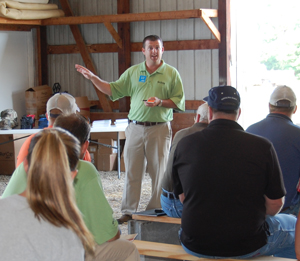 Kaleb Hellwig, who is district sales manager for BASF in the southern MO and IL region, says they have been getting great feedback from growers at field days around the countryside. “All the growers that have been able to see the Kixor family of products work are really impressed with the speed of control and the completeness of the broadleaves that it controls and that it will allow them a better tool to go in and plant earlier in a no-till situation in particular.”
Kaleb Hellwig, who is district sales manager for BASF in the southern MO and IL region, says they have been getting great feedback from growers at field days around the countryside. “All the growers that have been able to see the Kixor family of products work are really impressed with the speed of control and the completeness of the broadleaves that it controls and that it will allow them a better tool to go in and plant earlier in a no-till situation in particular.”
Final approval and registration for the Kixor technology is expected soon and at that time BASF will be launching several brands based on the technology, including Optill, Integrity and Sharpen.
See photos from the BASF Kixor Herbicide Technology plot tour in Belleville here on Flickr.
Listen to my interviews with Kaleb and Eric here:
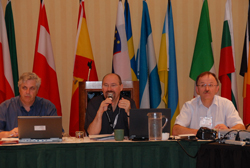 The executive committee of the International Federation of Agricultural Journalists (IFAJ) began meeting this morning with a report from president Mike Wilson of Farm Progress Companies.
The executive committee of the International Federation of Agricultural Journalists (IFAJ) began meeting this morning with a report from president Mike Wilson of Farm Progress Companies. 




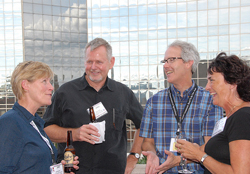 It was an absolutely gorgeous day in Ft. Worth today as our international visitors began arriving for the
It was an absolutely gorgeous day in Ft. Worth today as our international visitors began arriving for the  It sounds like a certain kind of soy music but it isn’t. It’s actually great advice about soybean rust and aphids.
It sounds like a certain kind of soy music but it isn’t. It’s actually great advice about soybean rust and aphids. A tasty sounding addition to your summer grill is American lamb. It looks like the competition was fierce when the American Lamb Board held their summer grilling recipe contest.
A tasty sounding addition to your summer grill is American lamb. It looks like the competition was fierce when the American Lamb Board held their summer grilling recipe contest.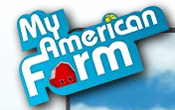 The
The 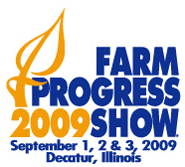 It’s time to look forward to the annual Farm Progress Show. I sure hope you’ve got your hotel reservations.
It’s time to look forward to the annual Farm Progress Show. I sure hope you’ve got your hotel reservations.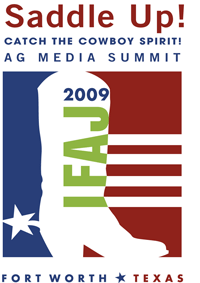 Today Cindy and Carly will be heading to Ft. Worth, TX for the combined IFAJ Congress/Ag Media Summit. I’m sure going to miss everyone but that doesn’t mean I won’t be lurking online!
Today Cindy and Carly will be heading to Ft. Worth, TX for the combined IFAJ Congress/Ag Media Summit. I’m sure going to miss everyone but that doesn’t mean I won’t be lurking online!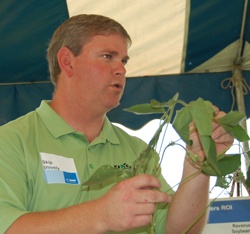
 There wasn’t a big crowd at the BASF Kixor Herbicide Technology plot tour event in Belleville, IL on Tuesday since many were out spraying, but the nearly 30 who attended were very interested in hearing and seeing what the new family of products from BASF could do for them.
There wasn’t a big crowd at the BASF Kixor Herbicide Technology plot tour event in Belleville, IL on Tuesday since many were out spraying, but the nearly 30 who attended were very interested in hearing and seeing what the new family of products from BASF could do for them. Kaleb Hellwig, who is district sales manager for BASF in the southern MO and IL region, says they have been getting great feedback from growers at field days around the countryside. “All the growers that have been able to see the Kixor family of products work are really impressed with the speed of control and the completeness of the broadleaves that it controls and that it will allow them a better tool to go in and plant earlier in a no-till situation in particular.”
Kaleb Hellwig, who is district sales manager for BASF in the southern MO and IL region, says they have been getting great feedback from growers at field days around the countryside. “All the growers that have been able to see the Kixor family of products work are really impressed with the speed of control and the completeness of the broadleaves that it controls and that it will allow them a better tool to go in and plant earlier in a no-till situation in particular.”